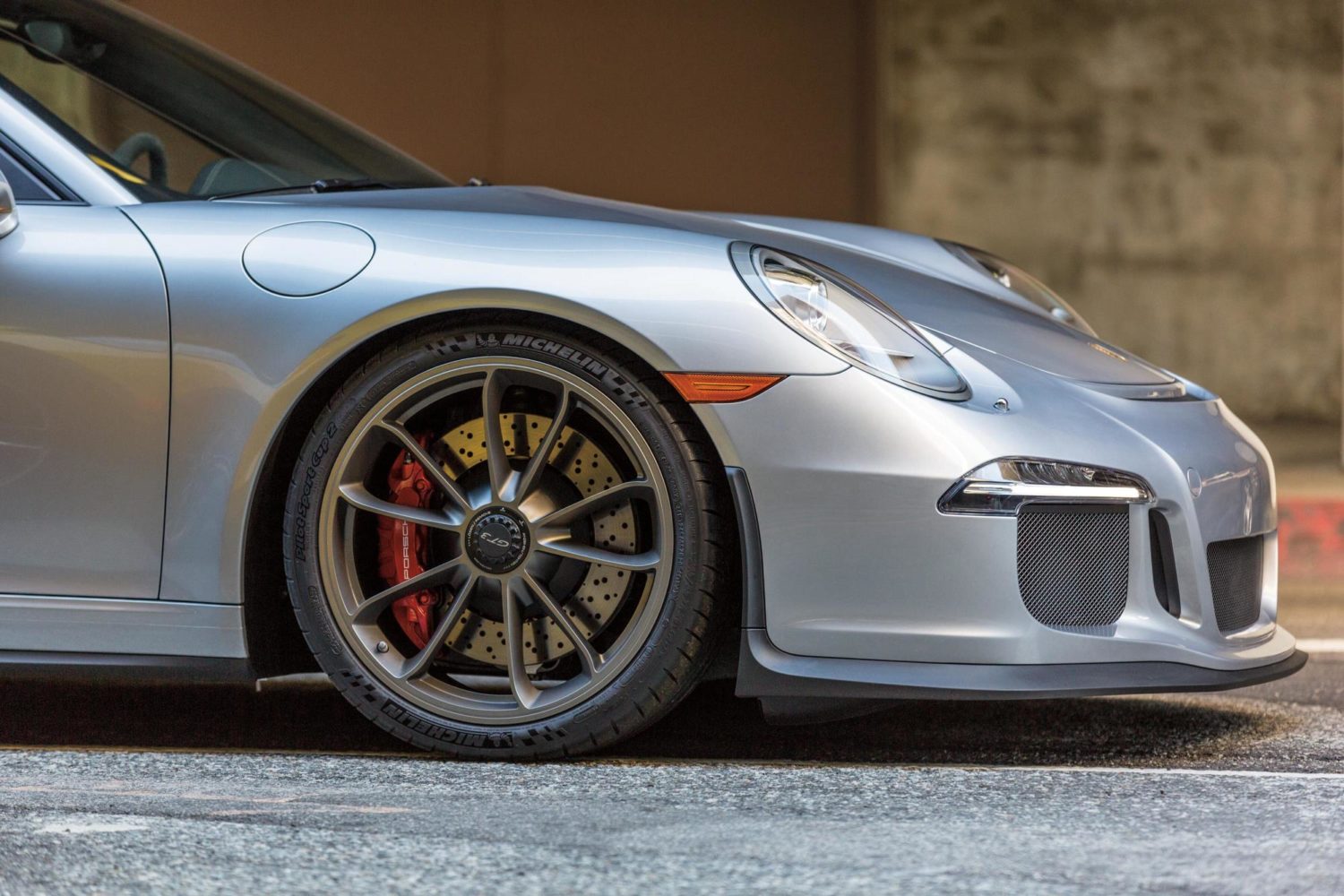
Photo courtesy of Michelin
Is it time to fit your beloved Porsche with a new set of tires, and you can’t decide what to buy? As you probably know, making the correct choice here is critical, as tires hugely impact how the car handles and rides. But with so many options on the market, this may not be as easy as it seems at first glance. And to make things even worse, there are several types of tires, each aiming at a different application. So, to help you decide, we’ll first explain what each tire type is for. And once that is cleared out, we’ll select the best tires you can buy for your Porsche in 2023 in each category.
Which tire types are available for my Porsche?
Max Performance Summer Tires
For year around, warm climates
For drivers who have performance street driving in mind, summer tires are the obvious first choice. And among them, Max Performance Summer tires will be the best pick for your Porsche, as they offer the most grip in dry and wet conditions, combined with superior handling and precise steering response. But as with everything, there are some downsides, including quicker wear and harsher ride when compared to other kinds of summer tires. This is because Max Performance Summer tires use softer rubber compounds and have stiffer construction. But because of their shallower tread pattern, summer tires don’t offer adequate grip in near-freezing temperatures.
Winter Tires
For harsh winter driving
Winter tires are a must-have If there’s a lot of snow and ice where you live and drive. These are critical for your safety, even if your Porsche has an all-wheel drive system. Winter tires are made from a special rubber compound and a deep tread pattern t with a lot of sipes, providing more grip in slippery conditions. These features, however, also make winter tires unsuitable for warm weather conditions. This is because they become too soft and can overheat under heavy loads when the temperature increases.
Note: If you plan to run winter tires, we recommend that you have another set of wheels and tires to use when temperatures warm up.
All-Season Tires
For climates with mild winters (light snow)
For drivers who want a performance-oriented tire that they can use year around, high-performance all-season tires are the answer. They use a softer rubber compound and have a deeper tread pattern than summer tires, which provides a better grip in colder temperatures and makes them more effective on wet and snowy roads. And on the other hand, all-season tires offer excellent ride comfort and tread life compared to summer and winter tires. However, being the jack-of-all-trades, all-season tires cannot match the performance of summer and winter tires in their respective climates. Still, these tires could be the perfect match if you use your Porsche as a daily driver and don’t push it to the limit.
Touring tires
For frequent use on highways
Touring tires might be the perfect pick for drivers who spend most of their time on the highway and cover many miles. They are designed to offer smooth and comfortable rides combined with excellent durability. This is possible thanks to their harder rubber compound and a shallower tread pattern. And while all this makes them ideal for long-distance traveling, touring tires are less suitable for extreme weather conditions or off-road driving.
All-terrain tires
For offroad use
As you probably know, Porsche Cayenne has one of the best all-wheel-drive systems, which makes it a capable offroader. But to truly exploit this potential, you might consider equipping it with a set of all-terrain tires. With deeper treads and large block-like chunks of rubber, these have a superior grip on gravel or mud. In addition, all-terrain tires have a robust construction, making them less prone to damage. On the downside, they are less comfortable and noisier than touring tires and are not excellent on wet or snowy roads.
What do numbers on the tire’s sidewall mean?
Every road tire has a series of numbers and letters on its sidewall, with each having its meaning. And if you know what these are, choosing between different tire variants will be much easier.
Dimensions
First is the tire dimension, which, in most cases, is shown as a three-number sequence. For example, let’s take a tire in 245/35 R19 dimension. The first number here – 245 – represents its width in millimeters. Next, following the slash mark is the number 35, which refers to the height of the sidewall. Instead of a number in millimeters, this is a percentage of the width. Then, we have the letter R, which means the tire has radial construction, which is used on almost all road tires today. Lastly, we have the diameter of the wheel in inches – 19 in this case – on which the tire fits.
Load Capacity Index
Next, following the dimensions, we have the load capacity index. This number has two or three digits and tells us about the maximum weight tire can safely carry. The higher this value is, the more load the tire can safely support. For instance, if you have tires with a load capacity index of 95, each of them can be loaded with 1521 lbs.
Speed Index
Behind the load index, you’ll find a letter called the speed index. It indicates the maximum speed at which the tire can be safely driven. And like with the load index, a higher letter (in alphabetical order) represents the higher speed rating. For example, if you have tires with a speed index of V, you can drive safely up to 149 mph.
DOT Number
Lastly, we have the DOT number, with DOT being short for Department of Transportation. This is a tire’s unique identification that begins with the “DOT” followed by a series of numbers and letters. Information contained by this includes the plant where the tire was made and, more importantly, the manufacturing date in MM/YY format. So, if the tire’s DOT number has a 0421 at the end, it was made in the fourth week of 2021.
Deciding between different tire sizes for your Porsche
With dimensions and other symbols explained, let’s now see what needs to be considered if you want to switch to a different tire size. As you’ve probably noticed, your Porsche has several optional tire sizes in addition to those currently fitted. So, let’s explain what might happen if you change the tire’s width or its sidewall’s thickness.
Wider vs. Narrower Tires
One thing that immensely impacts the car’s handling and performance is the tire width. Wider tires have a larger contact surface with the road beneath, which ensures more grip and improves handling, especially in dry conditions. In addition, car, especially sporty ones, look better with wider tires fitted. On the downside, they have more rolling resistance – which reduces gas mileage – and may be noisier. In contrast, narrower tires are usually quieter and offer better fuel efficiency. Additionally, narrow snow tires can be an excellent option, as they can cut through snow more effectively.
Thicker vs. Thinner Tires
Another thing you might be interested in is switching to a different wheel size, like going from 18 to 19-inch wheels. And while doing so, the tire’s overall diameter must remain unchanged to ensure the speedometer and various driver-assistance systems will work correctly. So, if fitting larger wheels, you’ll need to compensate for their increased diameter by using a tire with a thinner sidewall. Similarly, you’ll need tires with thicker sidewalls if switching to smaller wheels. And the thickness, or the height of the sidewall, can significantly change how the car behaves and performs on the road.
Thicker tires are, in most cases, better at absorbing bumps and vibrations, providing a smoother ride. And because their sidewalls have more flexibility, they are less likely to be damaged when going over curbs or potholes. On the downside, thicker tires are less responsive and may affect handling. Conversely, better handling, sharper steering response, and overall performance improvement are features tires with thinner sidewalls have to offer. But, as you may expect, these make the ride harsher and are more prone to damage from road hazards.
What is the difference between car and SUV tires?
By now, you might’ve noticed a category of tires dedicated solely to SUVs and crossovers. And while these may at first look quite similar to those intended for sedans or sports cars, there are several key differences between them.
First, because the SUVs are heavy, their tires must have more robust construction. This allows them to safely support the extra weight in all conditions. In addition, such tires are less prone to get damaged while going over bumps, curb stones, and other obstacles. Moreover, SUV tires usually have a more durable rubber compound, which reduces wear, especially at highway speeds. Lastly, their treads are designed to offer more grip on loose surfaces, such as wet grass or mud, when compared to similar car tires.
When is the time to get new tires on my Porsche?
Like most other car owners, you’re probably wondering when’s the best time to get a new set of tires. Have those fitted to your Porsche past their best, or there’s some more life left in them? Well, to answer this question, you must consider several critical factors.
The first and easiest to check is the tire depth, which you can measure with a tread depth gauge. With treads not deep enough, the tires will not perform well on wet and loose surfaces. So, if the tread depth on your tires is around 2/32 of an inch or less, they are worn, and you should get new ones.
Then, even if there’s enough tread, you should check how old the tires are. This is because the rubber compound becomes hard and brittle over time, reducing the tire’s flexibility and overall grip. As a result, tires older than six years should be replaced even if they haven’t done a lot of miles.
Lastly, we have tread wear, which may be uneven across the tire’s surface. Several things can cause this, with incorrect tire pressure being one of them. The problem is more severe if only one side of the tire is worn, as this indicates a suspension-related problem. This can be anything from misaligned wheels to damaged or worn suspension components. Whatever the issue may be, you should fix it before fitting new tires.
Best tires for your Porsche sports car (911, Cayman, or Panamera)
If you’ve made it this far, you probably know which tire category is right for you. Now, let’s help you pick the right tire. To simplify the tire buying process, we’ve used ratings and reviews from www.tirerack.com to identify the best tires in each class for your Porsche or other sports car.
Note: You won’t find any budget tires on our recommendation list. While we understand many car owners are budget conscious, higher end tires can actually be cheaper because many offer treadwear and road hazard warranties. Additionally, because tires last for several years, you don’t want to pick a bad tire that will leave you with a suboptimal driving experience.
Max Performance Summer Tire
Best in-class: Michelin Pilot Sport 4S
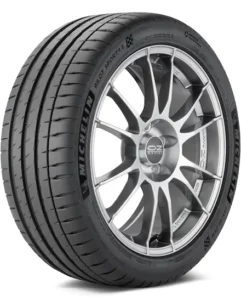
Pros:
- Excellent grip in the dry
- Impressive steering response and feel
- Excellent ride quality and tread life for its class
Cons:
- Expensive
TireRack.com Ratings:
- Dry Performance: 9.5 – Excellent
- Wet Performance: 8.8 – Excellent
- Winter/Snow Performance: N/A
- Comfort Performance: 8.8 – Excellent
- Treadwear: 8.2 – Good
Treadwear Warranty: 6 Years / 30,000 Miles (half mileage if front and rear tire sizes are different)
Best value tire: Bridgestone Potenza Sport
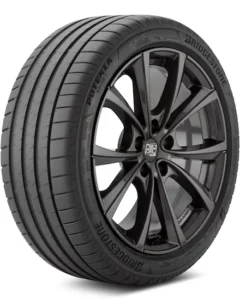
Pros:
- Good balance of dry and wet performance
- Precise steering response with good feedback
Cons:
- Increased rolling resistance
- Average comfort
TireRack.com Ratings:
- Dry Performance: 9.3 – Excellent
- Wet Performance: 8.9 – Excellent
- Winter/Snow Performance: N/A
- Comfort Performance: 8.4 – Good
- Treadwear: 6.4 – Good
Treadwear Warranty: None
Ultra high performance all-season tires
Best in-class: Pirelli P Zero All Season Plus Elect
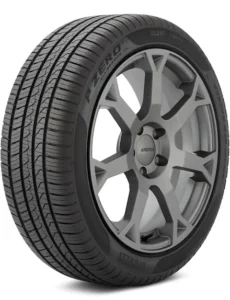
Pros:
- Excellent dry and wet performance
- Very good on snow and ice
- Great balance of driving feel, performance, and comfort
Cons:
- Expensive
TireRack.com Ratings:
- Wet Performance: 9.3 – Excellent
- Dry Performance: 9.2 – Excellent
- Winter/Snow Performance: 8.2 – Good
- Comfort Performance: 9.1 – Excellent
- Treadwear: 9.1 – Excellent
Treadwear Warranty: Unlimited time / 50,000 Miles (half mileage if front and rear tire sizes are different)
Best value tire: Vredestein Hypertrac All Season
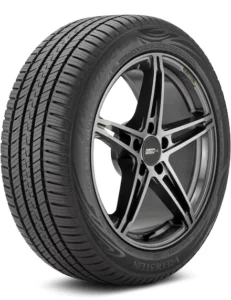
Pros:
- Balanced sports tyres with dynamic handling in the wet
- Good aquaplaning reserves
- Good comfort
- Fair price
Cons:
- Longer braking distances in the dry
TireRack.com Ratings:
- Wet Performance: 9.0 – Excellent
- Dry Performance: 9.1 – Excellent
- Winter/Snow Performance: 7.9 – Good
- Comfort Performance: 9.0 – Excellent
- Treadwear: 8.6 – Good
Treadwear Warranty: 8 years / 50,000 Miles (half mileage if front and rear tire sizes are different)
Winter tires
Best in-class: Michelin Pilot Alpin PA4
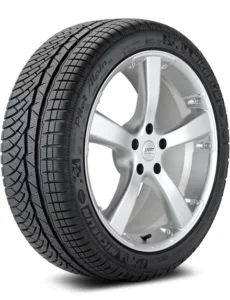
Pros:
- Excellent combination of dry, wet, snow, and ice traction
- Superb responsiveness
- Comfortable and quiet
Cons:
- Expensive
- Limited sizes offered may require new wheels
TireRack.com Ratings:
- Dry Performance: 8.8 – Excellent
- Wet Performance: 9.2 – Excellent
- Winter/Snow Performance: 8.7 – Excellent
- Comfort Performance: 8.9 – Excellent
- Treadwear: 9.0 – Excellent
Treadwear Warranty: 6 Years / 30,000 Miles (half mileage if front and rear tire sizes are different)
Runner Up: Bridgestone Blizzak LM001
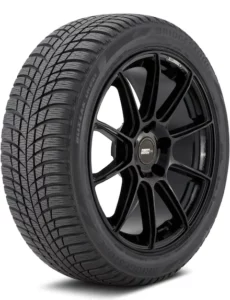
Pros:
- Good in the snow and wet
- Low noise
Cons:
- Long dry braking
- High rolling resistance
TireRack.com Ratings:
- Wet Performance: 8.7 – Excellent
- Dry Performance: 8.5 – Good
- Winter/Snow Performance: 8.9 – Excellent
- Comfort Performance: 8.6 – Excellent
- Treadwear: 8.0 – Good
Treadwear Warranty: None
Best tires for your Porsche SUV (Cayenne or Macan)
Max Performance Summer Tire
Best in-class: Michelin Pilot Sport 4 SUV
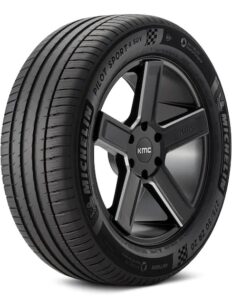

Pros:
- Good aquaplaning resistance
- Outstanding ride comfort
- Safe driving characteristics
Cons:
- Slightly less precise steering
TireRack.com Ratings:
- Dry Performance: 9.1 – Excellent
- Wet Performance: 8.5 – Excellent
- Winter/Snow Performance: N/A
- Comfort Performance: 8.5 – Excellent
- Treadwear: 7.2 – Good
Treadwear Warranty: 6 Years / 20,000 Miles (half mileage if front and rear tire sizes are different)
Best value tire: Bridgestone Alenza 001
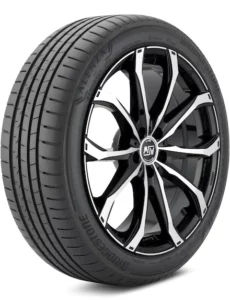

Pros:
- Excellent performance on dry roads
- Dynamic dry handling
- Precise steering behavior
- Good comfort
Cons:
- Average grass traction
TireRack.com Ratings:
- Dry Performance: 8.9 – Excellent
- Wet Performance: 8.4 – Good
- Winter/Snow Performance: N/A
- Comfort Performance: 8.8 – Excellent
- Treadwear: 8.2 – Good
Treadwear Warranty: None
SUV Touring All-Season tires
Best in-class: Michelin CrossClimate SUV
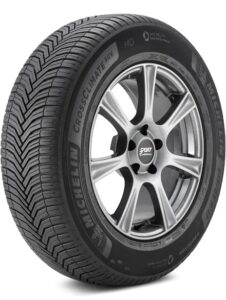

Pros:
- Balanced dry and wet performance
- Very good traction on light snow
- Excellent refinement and road comfort
Cons:
- Expensive
TireRack.com Ratings:
- Wet Performance: 9.5 – Excellent
- Dry Performance: 9.4 – Excellent
- Winter/Snow Performance: 8.7 – Excellent
- Comfort Performance: 8.8 – Excellent
- Treadwear: 8.6 – Excellent
Treadwear Warranty: 6 Years / 40,000 Miles (half mileage if front and rear tire sizes are different)
Best value tire: Cooper Discoverer EnduraMax
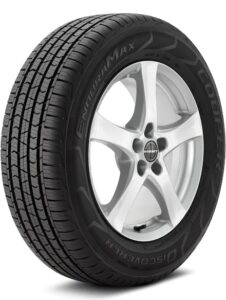

Pros:
- Very good traction on snow
- Precise steering
- Comfortable ride
Cons:
- Road noise
- Slightly lower wet traction
TireRack.com Ratings:
- Wet Performance: 9.1 – Excellent
- Dry Performance: 8.9 – Excellent
- Winter/Snow Performance: 8.6 – Excellent
- Comfort Performance: 8.6 – Excellent
- Treadwear: 9.1 – Excellent
Treadwear Warranty: 6 years / 60,000 Miles (half mileage if front and rear tire sizes are different)
Winter tires
Best in-class: Michelin X-Ice Snow SUV
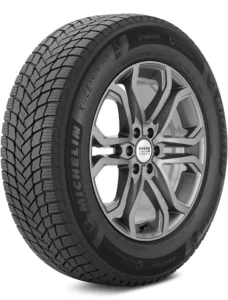

Pros:
- Superior handling and braking on snow and ice
- Stability and steering feel in dry
Cons:
- Slightly less grip on wet roads
TireRack.com Ratings:
- Dry Performance: 9.2 – Excellent
- Wet Performance: 9.1 – Excellent
- Winter/Snow Performance: 9.2 – Excellent
- Comfort Performance: 9.3 – Excellent
- Treadwear: 8.5 – Excellent
Treadwear Warranty: 6 Years / 40,000 Miles (half mileage if front and rear tire sizes are different)
Runner Up: Bridgestone Blizzak DM-V2



Pros:
- Very good capability in all winter conditions
- Great performance in wet
Cons:
- Road noise
TireRack.com Ratings:
- Wet Performance: 8.8 – Excellent
- Dry Performance: 9.1 – Good
- Winter/Snow Performance: 9.2 – Excellent
- Comfort Performance: 8.8 – Excellent
- Treadwear: 8.3 – Good
Treadwear Warranty: None
Our mission at eCarGuides
Here at eCarGuides, our goal is to help car owners make the best decisions possible when it comes to maintaining their vehicles. Find a highly-rated Porsche mechanic near you and detailed DIY guides for your Porsche.
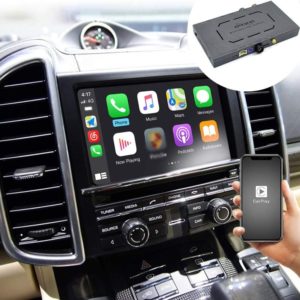
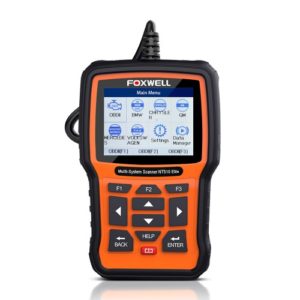
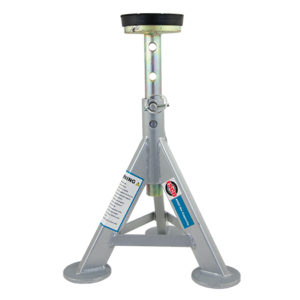
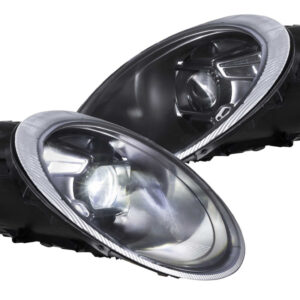

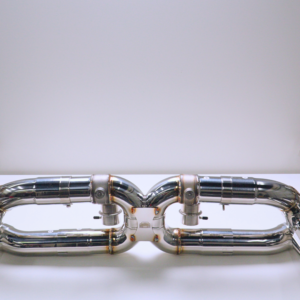

Mike mclaughlin says:
I have a 2018 911 carrera coupe and a 2009 cayman s… race fitted with roll cage headers
Performance chip and computer…
Runs great… handling on original tires is not so great at Hallet road race course here in Oklahoma … I
Need bigger or biggest tire/ wheel to improve lap times…. HELP!… what’s biggest tire /wheel I can put on a 2009 cayman S.. please /thanks
Lance Cowan says:
My name is Lance Cowan, I live on the big island of HI. I just purchased an 04 Porsche Boxster and found out that my BF Goodrich tires that were on car, dealer said that they were new, so now I am wanting to purchase new tires. I have read your reviews and like the Mich Pilot Sport 4 S. When I spoke with the guy from the Tirerack , he recommended the Cont All season. I live in HI and temp. Are from 65-95 depending on season and location on my island. I also may need rims because I hear a way noise on left rear , could be tire or rim. So, I need some help if possible .my email is cowanlance@gmail.com, cell 617-697-3001. Thanks, hope to hear from you. Mahalo.